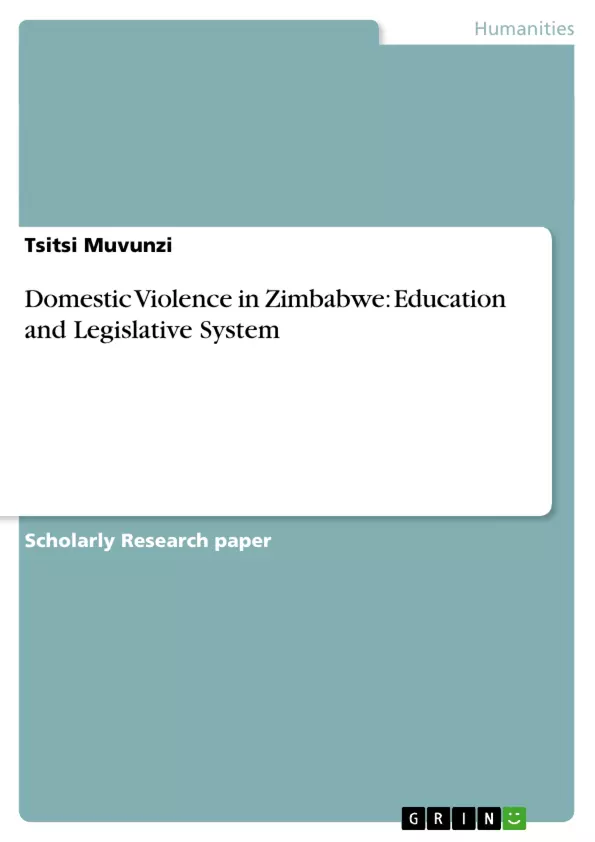One of the generally agreed techniques likely to facilitate high reductions of incidences of domestic violence among women is to empower them through education. This is because education has been regarded as the most significant instrument for changing women's subjugated position in the society. It not only develops the personality and rationality of individuals, but qualifies them to fulfill certain economic, political and cultural functions and hence improves their socio-economic status. The Zimbabwean case reveals that men and women with more than secondary education are less likely to justify domestic violence. However, the Zimbabwean case is peculiar in the sense that domestic violence permeates the whole society regardless of educational levels. Educated men and women perpetrate and experience domestic violence respectively irrespective of their educational levels. It is in this regard that this paper sought to establish why this is so by scrutinizing the education curriculum as well as analyzing whether the legal framework has contributed to reducing domestic violence.
Inhaltsverzeichnis (Table of Contents in English)
- Introduction
- Research Questions
- Education Level and Domestic Violence
- Attitudes towards Domestic Violence in terms of Education Levels
- Women's Experience of Physical Violence by Education Level
- Women's Experience of Sexual Violence by Education Level
Zielsetzung und Themenschwerpunkte (Objectives and Key Themes in English)
This paper explores the prevalence of domestic violence in Zimbabwe, focusing on the role of education and the legal system in addressing the issue. It seeks to determine why education has not significantly reduced domestic violence in Zimbabwe despite high literacy rates.
- The relationship between education levels and attitudes towards domestic violence.
- The impact of education on the experience of physical and sexual violence among women.
- The effectiveness of the Zimbabwean legal framework in combating domestic violence.
- The need for more comprehensive strategies to address domestic violence in Zimbabwe, considering the shortcomings of the current education system.
- The pervasive nature of domestic violence across all educational levels in Zimbabwe.
Zusammenfassung der Kapitel (Chapter Summaries in English)
The introduction sets the context for the study, highlighting the increasing rates of gender-based violence in Zimbabwe and defining domestic violence. It outlines the paper's focus on the educational and legal systems in addressing the issue.
The research questions section outlines the key inquiries that the study seeks to address, namely, why education has limited impact on reducing domestic violence and what strategies can enhance the effectiveness of education in this regard.
The chapter on education level and domestic violence explores the attitudes towards domestic violence based on education levels, analyzing data on justifications for wife beating. It further examines the prevalence of physical and sexual violence among women across different educational attainment levels.
Schlüsselwörter (Keywords in English)
The key terms and concepts explored in this paper include domestic violence, gender-based violence, education, Zimbabwe, legal framework, attitudes, physical violence, sexual violence, and empowerment. These terms reflect the focus on understanding the interplay between social, educational, and legal factors in addressing the prevalence of domestic violence in Zimbabwe.
Frequently Asked Questions
What is the main objective of the study on domestic violence in Zimbabwe?
The study explores why high levels of education in Zimbabwe have not significantly reduced domestic violence and evaluates the effectiveness of the legal system in addressing the issue.
Does education level influence attitudes toward domestic violence in Zimbabwe?
While data suggests that people with more than secondary education are less likely to justify domestic violence, the study finds that violence remains pervasive across all educational levels.
Why is the Zimbabwean case considered "peculiar"?
It is peculiar because domestic violence permeates the whole society, meaning even highly educated men and women are involved as perpetrators or victims respectively.
How effective is the Zimbabwean legal framework in combating domestic violence?
The paper scrutinizes the legal framework and suggests that current laws and educational curricula have shortcomings in effectively reducing the incidence of violence.
What is the proposed role of education in changing women's social status?
Education is viewed as a tool for empowerment that should develop rationality and improve socio-economic status, though its impact on domestic violence in Zimbabwe requires further strategic adjustments.
- Quote paper
- Tsitsi Muvunzi (Author), 2011, Domestic Violence in Zimbabwe: Education and Legislative System, Munich, GRIN Verlag, https://www.grin.com/document/214084



